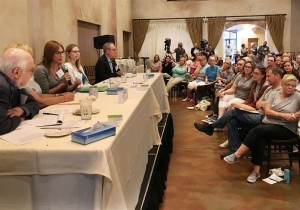From an Article by Don Hopey & David Templeton, Pittsburgh Post-Gazette, June 19, 2019
Environmentalists and researchers attending a panel discussion Tuesday called for studies to determine whether shale-gas drilling and fracking, or other pollution sources, could be responsible for an increasing number of childhood, teenage and young adult cancers in southwestern Pennsylvania.
Bernard Goldstein, professor emeritus of environmental and occupational health at the University of Pittsburgh Graduate School of Public Health, moderated the discussion and talked about a handful of investigations of environmental exposures and possible “clusters” of disease.
“This situation raises important questions about public health, what’s happening to people where they live, and the lack of responsibility by the industry,” Dr. Goldstein said.
He noted that he had been involved in more than a dozen investigations of potential disease clusters and said they are invariably “frustrating and humbling.” “That’s because the science is often not good enough to give us the answers we need,” he said.
About 150 people attended the event at Bella Sera in North Strabane, Washington County. It was held in response to the Pittsburgh Post-Gazette’s project, “Human toll: Risk and exposure in the gas lands,” that documented up to 67 childhood, teenage and young adult cancers over the past decade in Washington, Westmoreland, Fayette and Greene counties.
Those cases include 27 cases of Ewing sarcoma — a rare bone cancer with only 250 diagnoses nationwide each year.
A major concern is the Canon-McMillan School District, with a legacy of six cases of Ewing sarcoma in the past decade, along with 10 cases of other cancers, many of them rare types, among current students, including a girl who died in February from astrocytoma, a brain-spinal cord cancer.
Dee Kochirka, vice president of the Allegheny County chapter of the Izaak Walton League, said the league’s objective is to unite the state’s 80 or so environmental groups to speak with one voice on environmental health matters.
“We need to be heard. The scientific methods can take decades to prove true. It took 40 years to prove cigarettes cause cancer,” she said. “Are we going to wait until more children die to find out about shale gas drilling?”
Reports of childhood cancers continues to raise concern.
The panel raised concerns that identifying a cause of the cancers is difficult, but pollution from various sources, including shale gas development, could be responsible, said Dr. Ned Ketyer, a panelist and a retired pediatrician who now works with the Environmental Health Project. He noted that the number of Ewing sarcoma and other cancer cases is alarming.
“Only unbiased studies can lead to answers,” he said.
On Monday, more than 100 organizations and 800 individuals signed a letter to Gov. Tom Wolf and state Health Department Secretary Rachel Levine requesting an investigation of potential links between shale gas development and childhood cancers.
The group also requested that all new shale gas permitting be suspended until the health department determines whether such a link exists.
In response, the Marcellus Shale Coalition sent a letter later Monday to Mr. Wolf, terming the request “ridiculous.” It said those asking for the investigation represent “the insidious movement we are witnessing to shut down American shale gas development.”
He called the groups’ actions as “shameful” in the effort “to exploit the very real and heartbreaking issues associated with childhood cancer” that “should not be fodder to advance a political agenda.”
“The claims made by the signatories to the letter are an affront not only to the integrity of the researchers who have dedicated their lives to understanding rare cancers such as those affecting families in Southwest PA, but also to those who work in the industry, as well as the professionalism and expertise of your own environmental regulators and health professionals,” said David J. Spigelmyer, Marcellus Shale Coalition president.
Panelist Janice Blanock, whose son, Luke, died from Ewings sarcoma in 2016, said there’s no loss like the loss of a child and parents shouldn’t have to watch their children suffer, especially if it’s caused by something environmental.
“It’s time to come together as one united group of concerned citizens,” Ms. Blanock said. “It’s our right to make sure we have a healthy environment for our children. I want to ask each of you what you will do. What will you stand up for?”

